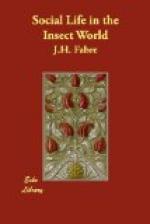It seemed as though the Great Peacock had taken possession of my whole house, more or less. What would it be upstairs, where the prisoner was, the cause of this invasion? Happily one of the two study windows had been left ajar; the road was open.
[Illustration: THE GREAT PEACOCK OR EMPEROR MOTH.]
Candle in hand, we entered the room. What we saw is unforgettable. With a soft flic-flac the great night-moths were flying round the wire-gauze cover, alighting, taking flight, returning, mounting to the ceiling, re-descending. They rushed at the candle and extinguished it with a flap of the wing; they fluttered on our shoulders, clung to our clothing, grazed our faces. My study had become a cave of a necromancer, the darkness alive with creatures of the night! Little Paul, to reassure himself, held my hand much tighter than usual.
How many were there? About twenty. To these add those which had strayed into the kitchen, the nursery, and other rooms in the house, and the total must have been nearly forty. It was a memorable sight—the Night of the Great Peacock! Come from all points of the compass, warned I know not how, here were forty lovers eager to do homage to the maiden princess that morning born in the sacred precincts of my study.
For the time being I troubled the swarm of pretenders no further. The flame of the candle endangered the visitors; they threw themselves into it stupidly and singed themselves slightly. On the morrow we could resume our study of them, and make certain carefully devised experiments.
To clear the ground a little for what is to follow, let me speak of what was repeated every night during the eight nights my observations lasted. Every night, when it was quite dark, between eight and ten o’clock, the butterflies arrived one by one. The weather was stormy; the sky heavily clouded; the darkness was so profound that out of doors, in the garden and away from the trees, one could scarcely see one’s hand before one’s face.
In addition to such darkness as this there were certain difficulties of access. The house is hidden by great plane-trees; an alley densely bordered with lilacs and rose-trees make a kind of outer vestibule to the entrance; it is protected from the mistral by groups of pines and screens of cypress. A thicket of evergreen shrubs forms a rampart at a few paces from the door. It was across this maze of leafage, and in absolute darkness, that the butterflies had to find their way in order to attain the end of their pilgrimage.
Under such conditions the screech-owl would not dare to forsake its hollow in the olive-tree. The butterfly, better endowed with its faceted eyes than the owl with its single pupils, goes forward without hesitation, and threads the obstacles without contact. So well it directs its tortuous flight that, in spite of all the obstacles to be evaded, it arrives in a state of perfect freshness, its great wings intact, without the slightest flaw. The darkness is light enough for the butterfly.




